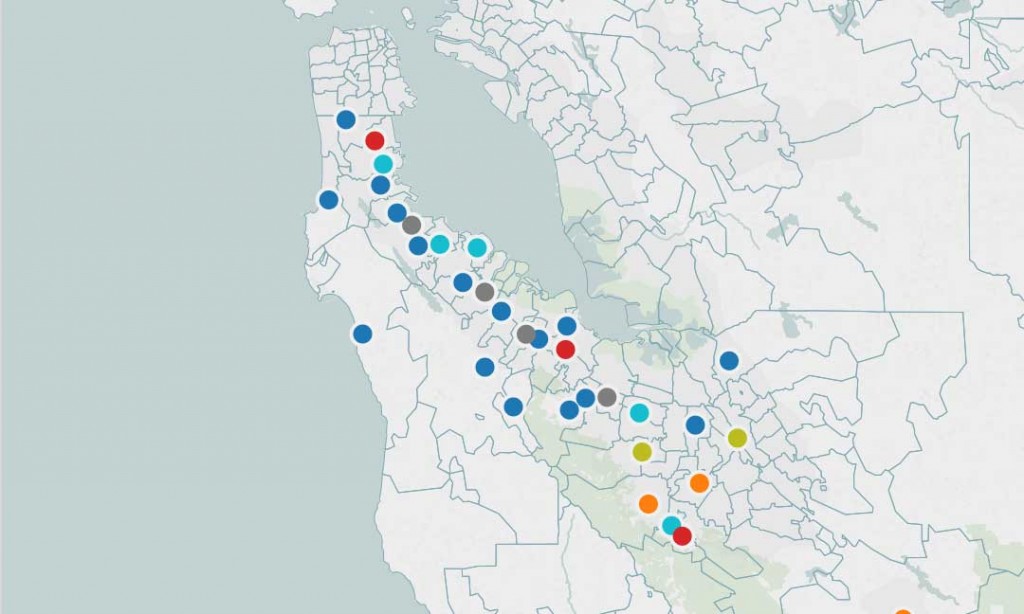Late last year, hotel alternative Airbnb made news when its listings per night exceeded 800,000, surpassing the number of rooms available through the entire Hilton hotel chain.
That growth has come with little regulation — and where there is regulation, little enforcement takes place. But that could be set to change, perhaps due in part to the upcoming 2016 Super Bowl, an analysis on short-term rentals suggests.

The analysis by Peninsula Press found that just six cities in San Mateo and Santa Clara Counties reported having rules against short-term rentals, and two have regulations governing their use. That’s out of 34 cities the Peninsula Press contacted. Six other cities are discussing in some way whether to enact ordinances regulating or banning the practice. Representatives of some of those cities say they’re hoping to decide whether to regulate in time for next year’s Super Bowl, which will take place at Levi’s Stadium and is expected to bring an influx of travelers. But across the Peninsula, most cities’ local laws don’t address how to deal with Airbnb and other short-term rental companies.
Municipal officials in towns and cities across the country have long expressed concern that the service could be abused for uses like drug deals and noisy parties in quiet neighborhoods. But the newest concern is less obvious: use of short-term rentals might drive up housing prices and exacerbate the area’s already problematic shortage of housing. The logic goes like this: if property owners can make more money by listing an apartment or house on Airbnb each night, why would they instead rent their properties to regular year-round tenants?
The data analysis suggests something else, too: bans may not be particularly effective. Palo Alto is one of the few cities that bans short-term rentals. It’s also the city with the third-highest number of listings available on Airbnb, based on a snapshot of one recent weekend worth of listings. Airbnb’s website showed that 192 properties were available in Palo Alto for single-occupant stays for the weekend of March 6 to 8, compared to 400 in San Jose, which had the most listings for the weekend. But take the cities’ relative sizes into account, and Airbnb’s popularity in Palo Alto becomes clear: there are over five times as many Airbnb listings per 1,000 citizens in Palo Alto as in San Jose. Sunnyvale and Monte Sereno, which are beginning to consider regulating Airbnb and rivals like HomeAway, had 145 and three listings for the same weekend, respectively.
Local Airbnb hosts are concerned at the prospect of ordinances regulating what they do. It is possible for an Airbnb host to gross $30,000 a year from the rental of a single room.
Airbnb host Nikki Stoddart said that if her city adopted San Francisco-style regulations that limit listings to 90 days per year if the owner does not live in the building, she would be unable to keep her San Mateo home listed on the site. Stoddart lives in San Francisco and rents her former home and a guesthouse on the property, which are full most nights of the year. San Mateo is currently considering whether to regulate Airbnb use.
Fellow San Mateo-based host Cheri Tsai lists two of the four bedrooms in her home on Airbnb and rents the third to a man whose immediate family lives in Mexico. She charges $55 a night for each Airbnb room, compared to the $45 a night her roommate’s rent works out to. Tsai feels that, in boom times, the benefits of short-term rentals being legal outweigh the potential issues.
“It feels like boom town all over again, like before we had the first bubble burst here in Silicon Valley,” Tsai said. “If the economy is good because people are coming here and traveling here to work, and they’re paying taxes or they’re buying dinner and they’re spending money in our town, which supplies jobs at the local Starbucks … I can see that as something that would be good for everyone, even people who are renting.”

Meanwhile, concerns about the impact of short-term rentals on employees of the hospitality industry may be overblown. While one might be tempted to think that Airbnb is another example of the digital technologies de-professionalizing a field, Sara-ann Kasner of the National Concierge Association does not agree.
“I don’t see any of it as a threat” to the hotel concierge profession, Kasner said. “I think it’s in addition to — I think it’s an enhancement, if you will, but it’s not a threat.”
The human touch and high level of knowledge about the area that concierges offer is what keeps them popular with hotel guests, Kasner added.
Airbnb host Stoddart thinks Airbnb is good for the lodging situation in Palo Alto and finds the city’s ban “unfortunate,” because, she says, the stock of available hotel rooms in Palo Alto is already limited.
In Tsai’s opinion, the potential for Airbnb hosts to affect hotels’ business model is even less of an issue in San Mateo. The only hotels in town, cater to business travelers, who rarely use Airbnb, since they want the conveniences offered by hotels, she said.
Airbnb is better geared toward non-business travelers, Tsai said, because it often offers things like access to a kitchen, which business travelers tend not to use.
William Lee, an Airbnb customer from East Palo Alto, said Airbnb can make a traveler’s trip less stressful and more convenient. On a road trip he took last year, Lee said he consistently paid one-third to one-half less staying with Airbnb hosts than he would have by lodging at a hotel. In addition, he says, the site can be a godsend during popular travel times: there is almost always an affordable listing available in a given city through Airbnb, even when big events and conventions leave hotels with no vacancies, Lee said.
Lee sees Airbnb as a positive disruptive force in the hospitality industry that restores some of what hotels have removed from the travel experience. “Traveling 200 or 300 years ago … maybe there weren’t that many hotels back in those days, so you were relying on strangers to open their homes to you,” he said. “You would have this fleeting exchange, but it was a valuable exchange. Airbnb takes modern travel, which has become this impersonal, corporate experience and taken it back to its roots of being exchanges between two people.”
Both Kasner of the National Concierge Association and Airbnb host Stoddart said that cities should regulate short-term rentals in some way. Kasner thinks regulations should be drafted with the protection of neighborhood peace, liability and quality of lodgings in mind. “I would think it would be common sense,” Kasner said. “Sooner or later, if you’re renting out rooms in your home for short-term rental, shouldn’t it be covered for liability? Shouldn’t there be some kind of guidelines set forth by maybe a government regulation that says you have to have wheelchair access, or your dog can’t bite the person that’s staying there?”
Though she is against bans on short-term rentals, Stoddart sees the possibility of a person owning numerous apartments and renting them out through Airbnb instead of to long-term tenants is a problem. That’s why she thinks that governments should limit the number of properties an owner can list on short-term rental sites to protect against the inflation of housing prices and housing scarcity.
Even Palo Alto might drop its ban — but not soon. The city council met on March 9 to discuss what to do about the ineffectiveness of the city’s ban. Currently, Palo Alto only investigates property owners after their neighbors complain. That’s resulted in just seven properties being investigated over the past year and a half. The council agreed to look at the issue again a year from now.
Palo Alto Councilmember Eric Filseth said that he and the rest of the council didn’t feel like the issue is a high enough priority currently to spend time addressing. The main problem Filseth sees with Airbnb rentals is that the city doesn’t collect its hotel tax from Airbnb hosts. But he isn’t too concerned about the effect of short-term rentals on housing supply and prices: there are currently 27,000 housing units in Palo Alto, he added, compared to the couple hundred rooms and properties here that are listed on Airbnb.
Tsai hopes Airbnb isn’t banned or regulated in ways that would keep her from using it in the future. The company allows her to make money with a low amount of labor involved — the main time drain Airbnb accounts for is the large amount of laundry she has to do. But its advantages are greater than that: it fills her large home, which would otherwise contain only Tsai, her roommate and her dog.
“It’s been so wonderful meeting people from around the world — and I don’t have to go anywhere,” Tsai said. “People are coming to me. I get to meet different people and have very enriching experiences.”
Stoddart, too, sees a larger meaning in her use of Airbnb. “I think it’s beautiful,” she said. “You come away with a new friend and one less stranger in your life.”
Airbnb did not reply to Peninsula Press’ written request for answers to our questions.
